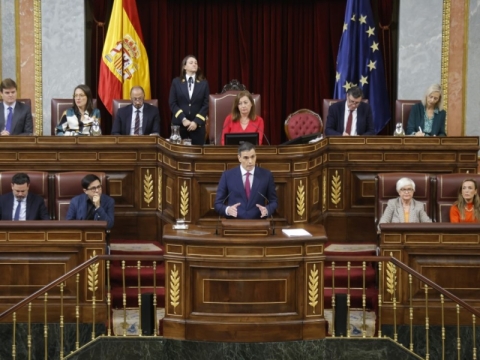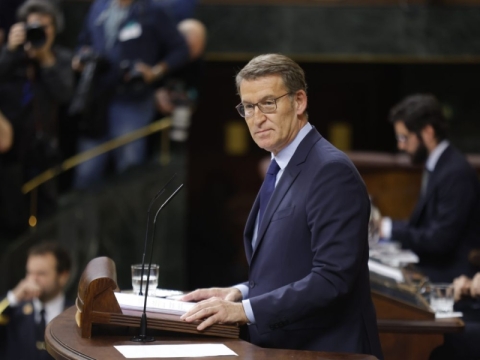Politics
Sánchez opposes socialist progressivism to the conservative retrograde option
Investiture debate of the socialist cand
USPA NEWS -
The acting President of the Spanish Government and socialist candidate for re-election, Pedro Sánchez, appeared this Wednesday at the investiture session, which he hopes to win because he has sufficient support after the agreements reached with the Republicans and the Catalan independentists, the independentists and the Basque nationalists, and other minority groups in Parliament. Sánchez presented himself as “a wall of democracy” against the right, whose leader, the conservative Alberto Núñez Feijóo, warned him that “history will not grant him amnesty.”
The debate began at noon with the speech of the candidate for the Presidency of the Government, Pedro Sánchez, who presented his Government program and requested the confidence of Parliament. The socialist candidate justified the Amnesty Law that his Government plans to approve as the way to overcome “the fracture, hatred and discord” that, according to him, caused the conservative Popular Party in Catalonia. On a day in which Parliament woke up surrounded by a strong police cordon for fear of altercations, Sánchez assured that he respected the demonstrations that are being called against the amnesty, but stressed that, above them, is the “supreme value” of the votes that he will obtain in the vote for his investiture. And he accused the conservative Popular Party of not condemning the demonstrations in front of socialist headquarters throughout Spain. The demonstrations were repeated this Wednesday, with thousands of citizens protesting against the amnesty for Catalan independence leaders.
The leader of the conservative opposition spoke out against the amnesty and, as a consequence, against the investiture of Pedro Sánchez. Alberto Núñez Feijóo accused the socialist candidate of “delirious” with his obsession with staying in office. “The amnesty does not improve coexistence because, if it were, it would have been approved five years ago. It does not improve it but rather it crushes it, divides the country in two, liquidates the principle of equality and allows issues that affect the future of Spain and national sovereignty to be monitored by international mediators”, he said. And he added: “You are the problem with your lack of words, with your moral restrictions, with your ambition. From his time in the Presidency will remain the image of Puigdemont” – the president of the regional government of Catalonia who declared independence and fled to Belgium when he failed in his secessionist attempt – “returning to Catalonia.”
Sánchez responded by confronting the “reactionary option” with the “progressive option.” In his opinion, in Spain there are only two options: “The retrograde right that exudes classism and despises those who think differently, are exclusive, reject changes and only propose a return to the past. The other is that of the progressive forces that want to move forward and that are convinced that they have a bright future that can illuminate the rest of the world.”
The debate will resume this Thursday with the interventions of the parliamentary groups that have not taken the floor in Wednesday's session. Afterwards, the president of Congress will set the time of the vote, which will be public by call. The deputies will be appointed one by one, in alphabetical order from a member of the Chamber chosen at random, so that they loudly say "yes", "no" or "abstention" to the granting of confidence. The members of the acting Government who are deputies and the Board will vote last.
The candidate will require the support of the absolute majority of the Chamber (176 deputies) to be invested as President of the Government. If Pedro Sánchez obtains the support of Congress, the president of the Lower House, Francina Armengol, will communicate the vote to King Felipe VI, who is responsible for appointing the President of the Government invested by Parliament.
Second vote
If an absolute majority is not reached in the vote to be held this Thursday, a second vote will be called after 48 hours. In this second debate, which, if applicable, would take place on Saturday, November 18, the candidate would once again ask for Parliament's support with a ten-minute speech. Pedro Sánchez would be sworn in as President if he obtains a simple majority in that second vote; that is, more votes in favor than against.
In the event that the confidence of the Chamber is not obtained, new proposals could be processed following the same procedure. However, the deadline is next November 27, when the two-month period provided for in article 99.5 of the Constitution ends, which began to run on September 27, the day of Alberto Núñez Feijoó's first vote as a candidate. If by that date no candidate has managed to be invested, the Chambers would be dissolved and new elections would be called for January 14, 2024.
Liability for this article lies with the author, who also holds the copyright. Editorial content from USPA may be quoted on other websites as long as the quote comprises no more than 5% of the entire text, is marked as such and the source is named (via hyperlink).







